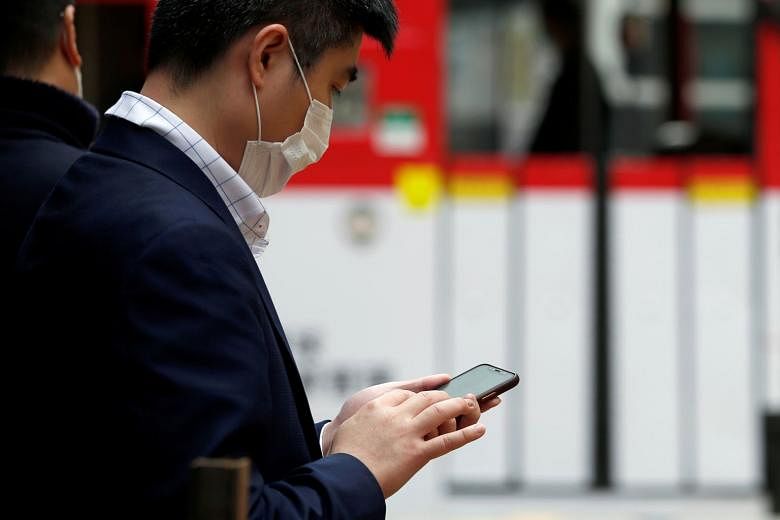HONG KONG - Business is booming for companies offering delivery or electronic payment services, particularly for food and groceries, as people practise social distancing and turn to digital transactions.
Foodpanda, owned by German outfit Delivery Hero SE, said it has been "experiencing week-on-week growth on demand" for its food delivery services since Chinese New Year.
Its groceries delivery arm, pandamart, launched in February, has also recorded "surging demand".
Foodpanda, one of the key players in Hong Kong, added that there has been a shift in order demand from the central business district such as Central to residential estates like in Kowloon and the New Territories.
Zeek, a company that offers online-to-offline and last-mile delivery solutions, said about 80 per cent of its business is coming from the bigger food and beverage (F&B) brands, and the remaining 20 per cent is non-food related, such as parcels delivery.
Mr Vincent Fan, chief operations officer at Zeek, said there has been a rise in order volume and the number of merchants who want to work with the firm since the start of the year.
"For traditional F&B groups, their orders increased quite a lot, from 50, 60 per cent to double. In some places we operate in, like Hong Kong and Thailand, McDonald's has actually banned dine in from 6pm. All these originally are dine-in orders but have been diverted to the online channel."
Mr Fan noted that outfits which used to do table bookings in restaurants or social events now want to tap the online delivery market by adding new functions to their existing businesses.
Others like shopping malls are now looking to set up an online platform to help their tenants, he added.
"Conventional wisdom is that you attract people to go to the shopping malls but now these malls want to help tenants be sustainable so they come to us to open an online shopping mall to allow customers to place orders from the different tenants," said Mr Fan.
Digital transactions are also picking up amid the coronavirus outbreak.
E-payment provider Octopus Cards, which accounts for 80 per cent of the city's stored-value facility market, said transaction volume and value in January and February for its mobile wallet rose 20 per cent and 30 per cent year on year respectively. The monthly average transaction amount of the O! ePay Mastercard went up by 60 per cent during the same period.
Octopus transactions at supermarkets and personal care stores were particularly popular, registering a 30 per cent rise in the first two months of the year compared to 2019, while personal health care stores recorded a more than 20 per cent jump in transactions in the same period.
The number of new retail shops, especially smaller and cash-based ones, that use the Octopus electronic payment system jumped as much as threefold since the epidemic began, Octopus Cards said.
"In view of the change in customers' and merchants' view in avoiding the handling of bank notes amid the coronavirus outbreak, the trend is expected to continue in the coming months," it added.
Hong Kong has long been known to be a city where cash is still king and the take-up of electronic payments has lagged behind other mainland Chinese cities.
The lower adoption rate has mostly been due to the fact that Hong Kong is a convenient city, unlike in the mainland where it is difficult to get a credit card and online services make it convenient for shoppers.
But social distancing would be a catalyst in driving people and businesses to adopt technology, particularly with the expected roll out of the 5G network commercially in Hong Kong in the second or third quarter, said Mr Wilson Chow, PwC's global technology, media and telecoms industry leader.
"Emerging technologies like Internet of Things and augmented reality can ride on this efficient network in order to explore many innovative services like the smart city initiative and this will form a better environment for people to adopt digital transactions in the future," he said.
While it is not known when the Covid-19 pandemic will blow over, Mr Chow noted that the online entertainment sector has "significant growth potential" as people spend more time at home.
"Many traditional ways of entertainment like cinemas, theme parks or Internet cafes are now closed so people will go back to online means. There will be a surge in video streaming, online mobile gaming and the KOL (key opinion leader) type of direct broadcasts," he said.
Once people get used to and enjoy these services, Mr Chow believes they will continue to do so even after the outbreak.
Similarly, Zeek's Mr Fan thinks the take-up of online shopping will be expedited. "What we see now is that the coronavirus outbreak is changing how people spend money and even how they live their lives. Once the consumers are willing to try for the first time to shop online, they will get used to it."


